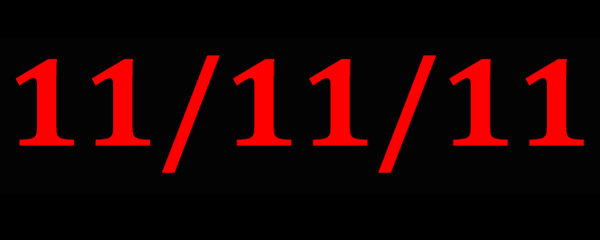What's So Special About the Date 11/11/11?

In medieval times, numerologists — those who searched for the mystical significance of numbers — believed all numbers had both positive and negative aspects … except for 11. In the words of the 16th century scholar Petrus Bungus, 11 "has no connection with divine things, no ladder reaching up to things above, nor any merit." Stuck between the divine numbers 10 and 12, 11 was pure evil, and represented sinners.
That doesn't bode well for Nov. 11, 2011, the date when three 11s will align for the first time in a century. A new horror film, "11/11/11," has even been made for the occasion, and it plays on (or perhaps plays up) people's fear of coincidences surrounding the number. Film characters experience the so-called "11:11 phenomenon," a tendency to look at the clock more often at 11:11 than at other times of the day. In the film, this is a warning of what's to come: "On the eleventh day of the eleventh month of the eleventh year, a gateway will open … and on this day, innocent blood will spill," says a voiceover in the trailer.
Indeed, the 11:11 phenomenon is widely reported in real life, with entire online discussion forums dedicated to figuring out what the number means. People say they feel haunted by 11s, which appear to them eerily often. To them, the impending date is bound to seem ominous.
On the flip side, some modern-day numerologists have deemed 11/11/11 auspicious, and according to local news sources around the country, an unusual number of couples have planned to marry on the day. The number 11 is also a favorite of gamblers — particularly blackjack and Keno players. So, amid all these alternative perspectives, what's the real deal about repeating 11s? Is there anything special about the numbers lining up?
No. With regards to the 11:11 phenomenon, rather than being a supernatural warning sign, psychologists say it is a classic case of "apophenia," or the human tendency to find meaning or patterns in randomly occurring data. This condition feeds on itself, because the more conscious you are of something — such as repeating 11s — the more often you'll notice it in the world around you, and thus the more certain you'll become that the pattern is real.
In online forums about the 11:11 phenomenon, people often say they didn't notice how many 11s appeared to them until hearing about the phenomenon from someone else. This is a tell-tale sign of apophenia: When they found out about the phenomenon, they subconsciously started keeping track of all the 11s they saw, with each new sighting seeming more significant than the last.
Just as there is nothing to fear about 11/11/11, there is no reason to be optimistic about the date, either.
Sign up for the Live Science daily newsletter now
Get the world’s most fascinating discoveries delivered straight to your inbox.
According to Alan Lenzi, professor of religious studies at University of the Pacific who studies biblical numerology, seeking meaning in numbers is a natural human tendency. "Cognitive scientists have demonstrated that the human brain is hard-wired to look for meaningful patterns in the sensory data it collects from the world," Lenzi told Life's Little Mysteries.
In most situations, this cognitive wiring helps us: It enables us to pick important information out of a background of random noise. But sometimes we overdo it by finding patterns where they aren't — from faces seen in the clouds to numerical coincidences. Once found, these patterns "are easily imbued with imaginative meaning," he said.
There is nothing unusual about the time 11:11 or the date 11/11/11, but our brains can't help noticing the repeating digits, and seeing them as meaningful. "Numbers that are already significant to us, such as calendar dates that also coincidentally fall into an obvious pattern, become doubly significant," Lenzi said. "11/11/11 is another example of people doing what people are cognitively prone to do: find significance."
This story was provided by Life's Little Mysteries, a sister site to LiveScience. Follow Natalie Wolchover on Twitter @nattyover. Follow Life's Little Mysteries on Twitter @llmysteries, then join us on Facebook.
Natalie Wolchover was a staff writer for Live Science from 2010 to 2012 and is currently a senior physics writer and editor for Quanta Magazine. She holds a bachelor's degree in physics from Tufts University and has studied physics at the University of California, Berkeley. Along with the staff of Quanta, Wolchover won the 2022 Pulitzer Prize for explanatory writing for her work on the building of the James Webb Space Telescope. Her work has also appeared in the The Best American Science and Nature Writing and The Best Writing on Mathematics, Nature, The New Yorker and Popular Science. She was the 2016 winner of the Evert Clark/Seth Payne Award, an annual prize for young science journalists, as well as the winner of the 2017 Science Communication Award for the American Institute of Physics.











